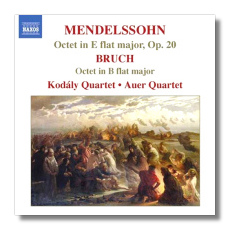
The Internet's Premier Classical Music Source
Related Links
- Latest Reviews
- More Reviews
-
By Composer
-
Collections
DVD & Blu-ray
Books
Concert Reviews
Articles/Interviews
Software
Audio
Search Amazon
Recommended Links
Site News
 CD Review
CD Review
Mendelssohn / Bruch

Octets
- Felix Mendelssohn: Octet in E Flat Major, Op. 20
- Max Bruch: Octet in B Flat Major, Op. posth
Kodály Quartet
Auer Quartet
Zsolt Fejérvári, double bass
Naxos 8.557270 DDD 56:28
On this release, Naxos has thoughtfully combined the most popular string octet of them all with one that has been recorded just a few times, but deserves to be better known. Mendelssohn's beloved Octet was written when he was 16, and immediately preceded his overture to A Midsummer Night's Dream. It's a work of astonishing passion for a composer so young; one can practically hear Felix's hormones coursing throughout this work. In contrast, Bruch's Octet is a very late work, dating from the composer's ninth decade. There's little about it that seems valedictory, however. Bruch almost certainly knew Mendelssohn's Octet, and it is likely that he remembered it or even referred to it as he composed his own Octet. There's one important difference though: while Mendelssohn's Octet is scored, in effect, for two string quartets, Bruch's substitutes a double bass for the second cello. Another difference is that Bruch's Octet dispenses with a Scherzo movement.
Sometimes recordings of the Mendelssohn Octet pair an established quartet with a younger group. Telarc's recording, for example, features the Cleveland and Meliora Quartets, both associated with the Eastman School of Music. The Kodály Quartet has been in existence since 1970, although three of its four original members had been playing together even before that. The Auer Quartet was formed in 1990. Both quartets are comprised of musicians who studied at the Ferenc Liszt Music Academy in Budapest. Double bassist Zsolt Fejérvári also is an alumnus – and a relative, I assume, of the Kodály Quartet's violist, János Fejérvári.
The present recording of the Mendelssohn stands up to the competition nicely, especially at a budget price. The musicians take a sensible, middle-of-the-road approach – the phrase that comes to mind is "old school." Others have played this music with a richer timbre, others with greater excitement, and still others with greater imagination. The Kodálys and the Auers are lean and light, and concomitantly youthful in their interpretation of both octets. I wouldn't want this to be my only recording of the Mendelssohn, but it's a good choice at any price. However, I think coupling the Bruch with the Mendelssohn is what makes this disc most desirable. Good studio sound complete booklet by annotator Keith Anderson add to the CD's value.
Copyright © 2006, Raymond Tuttle




















